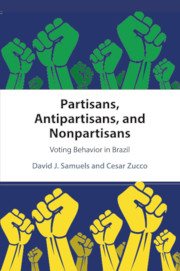Book contents
- Frontmatter
- Contents
- List of Figures
- List of Tables
- Acknowledgments
- 1 Introduction
- 2 Partisanship and Antipartisanship in Brazil
- 3 The Strength of Partisan Attitudes in Brazil
- 4 The Rise (and Decline) of Petismo
- 5 Partisanship, Antipartisanship, and Voting Behavior
- 6 Partisanship and Antipartisanship in Comparative Perspective
- 7 Conclusion: Parties, Voters, and Brazilian Democracy
- References
- Index
7 - Conclusion: Parties, Voters, and Brazilian Democracy
Published online by Cambridge University Press: 10 May 2018
- Frontmatter
- Contents
- List of Figures
- List of Tables
- Acknowledgments
- 1 Introduction
- 2 Partisanship and Antipartisanship in Brazil
- 3 The Strength of Partisan Attitudes in Brazil
- 4 The Rise (and Decline) of Petismo
- 5 Partisanship, Antipartisanship, and Voting Behavior
- 6 Partisanship and Antipartisanship in Comparative Perspective
- 7 Conclusion: Parties, Voters, and Brazilian Democracy
- References
- Index
Summary
Conventional scholarly wisdom has long assumed that mass partisanship is weak and immaterial in Brazil – that voters’ stated affinities or antipathies for this or that party have little effect on their political attitudes and behavior, particularly when compared against the weight of candidates’ personal qualities and performance in office, whether in terms of managing the economy or providing constituent service. This view is incorrect. Despite Brazil's confusing party system and candidate-centric electoral rules, both positive and negative partisanship have mattered a great deal, for a substantial proportion of Brazilian voters.
Most research in political science has focused on positive partisanship, but Social Identity Theory (SIT) teaches us that out-group antipathy may actually drive attitudes and behavior more than any in-group affinity. SIT also suggests that positive and negative partisan attitudes do not necessarily mirror each other. These two notions pushed us to focus on both sides of the partisanship coin, in an effort to better understand Brazil's party system in the electorate.
Chapter 2 showed that observers have underestimated the extent of partisanship in Brazil's electorate. For about half of Brazil's voters – the nonpartisans – the conventional wisdom is true: partisanship plays no role in determining political attitudes or voting behavior. Yet this means that the other half have held either positive and/or negative partisan attitudes, or both. Chapter 2 also showed that since the 1980s, most partisan attitudes in Brazil have revolved around the PT, whether for or against, and demonstrated that the divide between petistas and antipetistas cannot be boiled down to sociological or demographic factors or to differences of opinion on important policies. Instead, the divide is a product of distinct normative views about how politics should work – particularly, about the value and purpose of democracy. Petistas have supported democracy because they want to use it to bring about social and economic change; antipetistas are less committed to democracy to begin with, and tend to fear change.
Chapter 3 turned to the relative strength of positive and negative partisan attitudes in Brazil. It showed that positive partisanship is as tightly “bounded” as it is elsewhere, particularly for the PT, and revealed that both positive and negative partisans engage in motivated reasoning.
- Type
- Chapter
- Information
- Partisans, Antipartisans, and NonpartisansVoting Behavior in Brazil, pp. 160 - 170Publisher: Cambridge University PressPrint publication year: 2018



